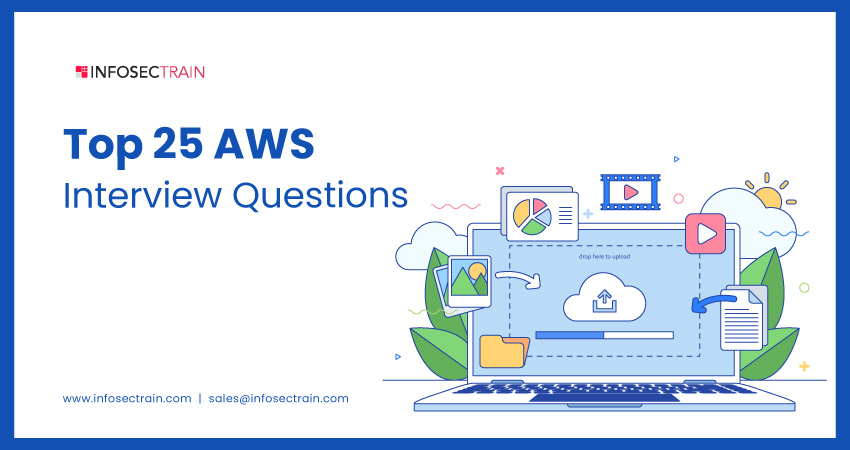Top 25 AWS Interview Questions
Amazon Web Services (AWS) has been the market’s top cloud service provider over the past few years. Many companies are actively seeking out AWS professionals, and as the use of AWS cloud services grows, the demand for AWS cloud professionals is also increasing. These professionals earn among the highest salaries in the IT industry.

If you are preparing for an AWS interview and hoping to land your dream job, this article has covered the top 25 frequently asked interview questions to help you succeed.
AWS Interview Questions and Answers
1. Describe AWS.
AWS stands for Amazon Web Services, a collection of online computing services that offers scalable, reliable, user-friendly, and affordable cloud computing solutions.
2. In AWS, what is auto-scaling?
Auto-scaling is a service that automatically scales up or down resource capacity to provide the consistent and continuous performance of applications at the most cost-effective rate. The service ensures multiple resources or instances to run the application successfully in minutes.
3. What services are used for developing a centralized logging solution?
You can use the following essential services:
- Amazon CloudWatch Logs
- Amazon ElasticSearch
- Amazon Kinesis Firehose
4. What types of virtualization are there in AWS?
There are three primary forms of virtualization in AWS:
- Hardware Virtual Machine (HVM)
- Paravirtualization (PV)
- Paravirtualization on HVM
5. What are the various types of EC2 instances based on their prices?
There are four types of EC2 instances:
- On-demand instance
- Spot instance
- Reserved instance
- Dedicated instance
6. Why are lifecycle hooks used in autoscaling?
In autoscaling, lifecycle hooks are used to extend the time to wait for the actions to scale in or scale out the event.
7. What are the most popular categories of Amazon Machine Image (AMI) design?
There are three primary categories of AMI design:
- Fully Baked AMI
- JeOS AMI
- Hybrid AMI
8. Can you explain the differences between AWS S3 and EBS?
S3 and EBS are two file storage services offered by Amazon. The following are some differences between AWS S3 and EBS:
| S3 (Simple Storage Service) | EBS (Elastic Block Store) |
| It is not just confined to EC2. | It is specifically meant for EC2 instances. |
| It is an object-level data storage. | It is block-level data storage. |
| It can store the data redundantly across multiple Availability Zones. | It can store the data redundantly in a single Availability Zone. |
| It allows you to follow the utility-based model and prices as per your usage. | In EBS, you need to pay for the provisioned capacity. |
9. What is the maximum message size that is stored in SQS?
SQS allows messages up to 256 KB in size.
10. What is Amazon Simple Email Service (SES)?
Amazon Simple Email Service (SES) is a cloud-based email service. Users may send and receive emails at a lower cost using their email addresses and domains with the help of this service.
11. How do you monitor the Amazon Virtual Private Cloud (VPC)?
You can monitor Amazon VPC by using the following:
- CloudWatch Logs
- Amazon VPC IP Address Manager (IPAM)
- VPC Flow Logs
- CloudTrail Logs
12. How many subnets can a VPC support?
The Amazon Virtual Private Cloud (VPC) can support up to 200 subnets.
13. What are the uses of EC2 instances?
There are five types of EC2 instances that are useful for the following activities are:
- General purpose: Used for development environments, web servers, etc.
- Memory optimized: Used for anything that requires memory-intensive applications, such as real-time big data analytics.
- Compute optimized: Useful for computationally demanding applications like high-performance web servers.
- Storage optimized: Useful for activities requiring a lot of storage.
- Accelerated computing: Useful for incorporating additional hardware (GPUs, FPGAs) to offer high parallel processing for activities like graphics processing.
14. What are the benefits of AWS’s Disaster Recovery?
Benefits of AWS’s Disaster Recovery include:
- Decreases downtime
- Continuous replication can prevent data loss
- Recover your data and IT infrastructure quickly
- Safeguard databases and business applications
- Provide high flexibility for adding massive amounts of data quickly and easily
- Effective monitoring tools that can alert you if your system behaves maliciously
- Storing backups on Amazon S3 is highly recommended as it offers a 99.9% durability rate for backed-up data
15. What things need to be considered while migrating to AWS?
The following things to consider before moving to AWS:
- Cost of operations
- Security
- Availability
- Productivity of the workforce
- Operational resilience
- Agility in business
- Cost reduction
16. Describe AWS Snowball.
Amazon Snowball is a data transport service that transports enormous amounts of data into and out of Amazon Web Services (AWS) through physical storage devices that are secure for physical transmission. It aids in addressing challenges that may occur with large-scale data transfers, such as high network prices, prolonged transfer times, and security concerns.
17. What are the features of AWS Snowball Edge?
The following are the primary features of AWS Snowball Edge:
- Clustering
- File interface
- Faster data transfer
- S3-compatible endpoint
- Run AWS Lambda function
18. Describe an Elastic Transcoder.
AWS’s Elastic Transcoder is a media transcoder service. It transforms the media files stored in an S3 bucket into media files in various formats supported by multiple devices, including laptops, PCs, tablets, smartphones, and more.
19. Describe an Elastic IP (EIP).
An Elastic IP address is a reserved static public IP address created explicitly for dynamic cloud computing, where the instances can be stopped and restarted multiple times.
20. What is Amazon Elastic File System (EFS)?
Amazon Elastic File System (EFS) is a scalable, fully-managed file storage service provided by AWS. It provides a simple and scalable file system for use with EC2 instances, containerized applications, and other AWS services. With EFS, users can create and manage file systems that multiple instances can access simultaneously.
21. How are Spot, On-demand, and Reserved Instances different from each other?
Spot Instances allows users to bid on unused EC2 capacity, providing a significant discount on the regular price.
On-demand Instances are purchased at a fixed hourly rate, with no upfront commitment or long-term contract.
Reserved Instances are purchased for a one-time fee and offer a significant discount on the hourly rate for a specified term.
22. What is AWS Elastic Disaster Recovery?
AWS Elastic Disaster Recovery is a service provided by AWS that enables businesses to quickly and easily recover their IT systems and applications in the event of a disaster or disruption.
23. What are EC2 Autoscaling’s advantages?
Advantages of EC2 Autoscaling include:
- It identifies a problematic instance, terminates it, and then starts a new instance to replace it.
- It helps ensure that your application always has the appropriate processing power and provisioning capacity to manage the current traffic demand.
- It optimizes cost and performance by only provisioning instances when necessary.
24. What do you mean by AWS Lightsail?
AWS Lightsail is a Virtual Private Server that offers cloud users all the computational power, memory, and networking capabilities they need to start and run websites and applications in the cloud.
25. What are the key features of AWS Lightsail?
Key features of AWS Lightsail include:
- It offers easy-to-install instances.
- It offers a simple method for operating containers in the cloud.
- It offers a strong Application Programming Interface (API).
- It offers simplified load balancers.
- It offers a fully configured MySQL or PostgreSQL database plan.
We hope these Amazon Web Services (AWS) interview questions and answers were helpful to you.
You can also refer to the following:
How can InfosecTrain help you?
InfosecTrain is one of the leading providers of training and consultancy services worldwide. At each step of your journey to becoming an AWS professional, we are here to help. We provide instructor-led certification training courses on AWS that will help you to understand the topics precisely that you will need to clear your AWS Interview, such as:
We wish you continued success in all of your future endeavors!











 1800-843-7890 (India)
1800-843-7890 (India)